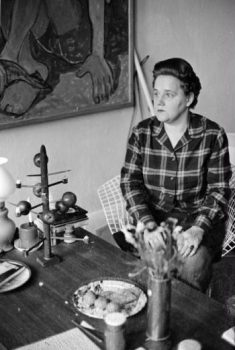Author: Eeva-Liisa Manner
An evening with Mr Popotamus
Issue 1/2004 | Archives online, Fiction, Prose
‘Hippopotamus’, a short story from Kävelymusiikkia pienille virtahevoille (‘Passacaglia for small hippopotami’, Tammi, 1958). Introduction by Tuula Hökkä
Someone came gasping up behind me at high speed, stopped, and thrust a bundle under my arm, whispering hoarsely and agitatedly: ‘Keep hold of this, hide it! They’re after me –’ And before I’d woken up to what was going on he’d disappeared round a corner.
I was holding a warm living creature, a hippopotamus. Presumably stolen from some zoo or some private person who loved hippopotami; perhaps the man was a sailor and had brought the animal from abroad.
However it was, the hippo needed a safe place. I decided to take it home; I’d had cats and dogs, hadn’t I? – and once a little marmot. I’d always longed for a giraffe. OK, a hippo was just as good. After all, I could put an ad in the paper later: ‘Found: a hippopotamus. Hippo returned on production of identification marks.’ More…
This journey
Issue 3/1995 | Archives online, Fiction, poetry
Poems from Tämä matka (‘This journey’, 1956). Introduction by Jukka Petäjä
You took a planet
For Erik Lindegren
The stars arranged themselves
round a red magnet
by request,
and shaped fugitive systems and mirror reflections,
space’s sonorous grammar.
Oh, those hatched-out faces of the apathetic! –
and the grudge of those who can no longer read
(apart from cruel bibles, containing pressed roses and corpses).
Oh, ourselves! – here in the lonely sublunar place, hair and eyes in the wind, in our hands ignorance and boomerang-echoes.
Oh, these vaultings of the word! – changing skies
where the glyphs rise like distress flags.
I looked for a question whose answer is this mutabor. I kneel to gather up the shattered fragments of a glyph scored with the brilliant wounded secret where I lost my wings before my choosing fingers were formed.
More…
Burnt orange
Issue 3/1992 | Archives online, Drama, Fiction
Extracts from the play Poltettu oranssi (‘Burnt orange‘): ‘a ballad in three acts concerning the snares of the world and the blood’. Introduction by Tuula Hökkä
The scene is a small town in the decade before the First World War
Cast:
DR FROMM
an imperial,bearded middle-aged gentleman
ERNEST KLEIN
a moustached, ageing, slightly shabby leather-manufacturer
AMANDA KLEIN
his wife, well-preserved, forceful, angular
MARINA KLEIN
their daughter, shapely, withdrawn, wary
NURSE-RECEPTIONIST
open, direct, not too ‘common’
ACT ONE
Scene two
After a short interval the receptionist opens the door and ushers Marina Klein into the surgery. Exit the receptionist. Marina immediately goes to the end of the room and presses herself against the white wall. The white surface makes her look very isolated in her ascetic black dress. The Doctor, who now appears to be headless – an impression produced by the lighting and the yellowish background – half-turns towards her. More…
World noises
Issue 3/1992 | Archives online, Fiction, Prose
Poems from Fahrenheit 121 (1968) and Jos suru savuaisi (‘If grief should smoulder’, 1968). Introduction by Tuula Hökkä
For truth to tell
I like horses most
creating Those
It came off best
*
Morning came to the meadow;
horses were born out of mist.
How quiet they were:
one leant a head on his master’s armour,
his breath rose warm,
his moist eye gleamed in the daybreak,
his coat a casbah carpet-weaver’s hand-woven pile,
his muzzle softer than a phallus. More…
If grief smoked
Issue 1/1989 | Archives online, Fiction, poetry
Poems from six collections of poetry. Introduction by Herbert Lomas
The City
How the houses have ascended in this city,
the abysses deepened, the water blackened,
soon to be creeping along the streets.
The railings are rusting through,
the water table’s rising,
the cellars are slopping.
Fear is rising, or being covered up
behind strangling discretion,
outbreaks of crime.
The Othello of Sand Alley
Issue 1/1989 | Archives online, Drama, Fiction
Eeva-Liisa Manner’s Woyzeck is an independent ending to Georg Büchner’s fragmentary play. Introduction by Riitta Pohjola
PROLOGUE
(Dawn in the market square of Leipzig. A gallows looms, dimly visible in the distance. Brisk rumble of drums.)
1st WOMAN
What’s going on here?
1st MAN
They’re getting ready for an execution. Some villain’s going to be executed in public.
1st WOMAN
Who?
2nd WOMAN
Franz Woyzeck. I guess you know him, the barber. More…
Poems
Issue 4/1978 | Archives online, Fiction, poetry
Poems from Kuolleet vedet (‘Dead waters’). Introduction by Aarne Kinnunen
1
A faraway tucked-away room
Leathery harness odour
An obscure carriage house
A mighty delay
And out through a narrow gate slipped childhood
And a pony cart was coming to get us
swishing on the sand
White gloves on the coachman
and ornamented with a whip, the lash sounding
We were driving through spotted leaves
Lustre, dolour, lustre,
remembrance, snow
And suddenly the driver was gone
and nothing but hands were gripping the horse
and they were leading me I don’t know where. More…

